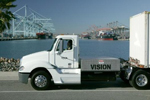
Port of Los Angeles Considering Zero-Emission Hybrid Trucks
The Port of Los Angeles is entering into negotiations with Los Angeles-based Vision Industries for the purchase and evaluation of Vision’s hydrogen fuel cell hybrid-electric trucks.
The heavy-duty big-rigs will be tested to evaluate their suitability for short and medium distance cargo-hauling (or drayage) operations, and other similar applications.
Vision Industries has been marketing its Class 8 zero-emission hydrogen fuel cell hybrid-electric truck for more than a year and will now work with the Port of Los Angeles to further evaluate its performance in the rigorous port trucking environment. The trucks are powered by a combination of a hydrogen fuel cell and lithium batteries and have a potential range of up to 400 miles.
“The Port’s partnership with Vision Industries reflects our unwavering commitment to pursuing sustainable clean air solutions for the long-term,” said Port Executive Director Geraldine Knatz, Ph.D. “Our success with the Clean Truck Program has motivated us to continue to be at the cutting edge of zero-emission transportation solutions that significantly reduce greenhouse gas emissions.”
“We are very pleased to work with the Port of Los Angeles to demonstrate the viability of our zero emission, hybrid electric/hydrogen fuel cell truck,” said Martin Schuermann, president and chief executive officer of Vision Industries. "These vehicles are 30 percent to 40 percent less expensive to operate than diesel trucks. We expect a strong market demand once these trucks are in the hands of California medium and heavy duty equipment operators."
The Port’s Clean Truck Program, which began in October 2008, has removed thousands of polluting trucks from the Port and delivered at least an 80 percent reduction in air emissions while maintaining an efficient drayage fleet.
Looking forward, the Port of Los Angeles believes that zero emission vehicles will be necessary in coming years in order to contribute to achieving the goals for the transportation and port sectors under California’s AB32 greenhouse gas reduction legislation and the City’s GreenLA initiative. This has led the Port to begin planning for a transition to zero emission vehicles over the next decade.
The trucks will be put through a series of on-road and laboratory tests to demonstrate its usefulness in a variety of drayage duty cycles, including different loads, road conditions and travel distances. Local drayage trucking companies are expected to assist with the demonstration over the next 12 to 18 months, and the University of California at Riverside’s College of Engineering Center for Environmental Research and Technology (CE-CERT) laboratories will help guide the data collection and analysis.
CE-CERT’s partnership with the Port of Los Angeles on this project is expected to help demonstrate the utility of zero emission vehicles in a variety of medium and heavy-duty vehicle applications that extend beyond the port setting. The Port of Los Angeles will be submitting a proposal for funding from the California Energy Commission to help support this project. The California Energy Commission has established an Alternative and Renewable Fuel and Vehicle Technology Program to develop and deploy advanced transportation technologies to help attain the state’s climate change policies.